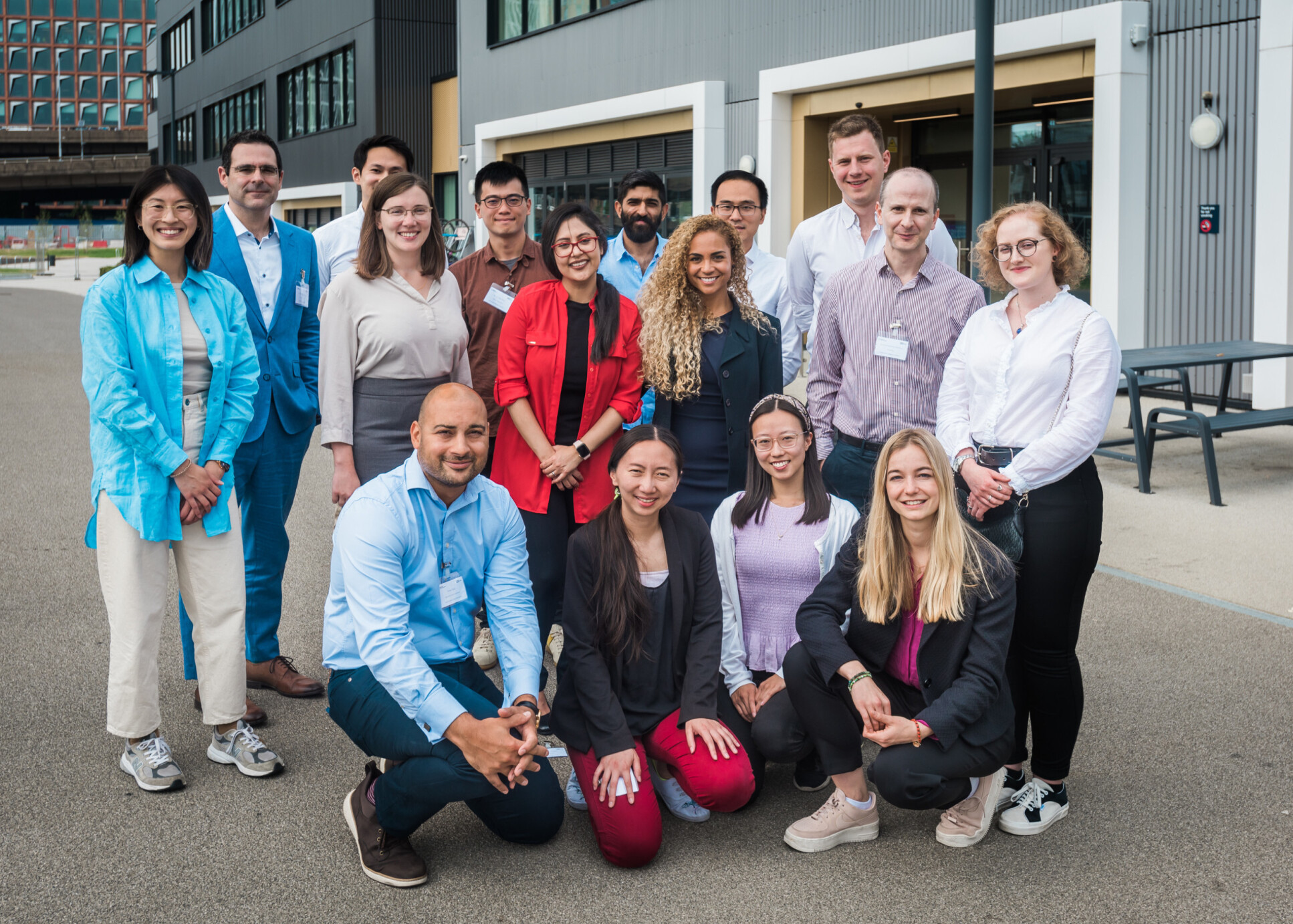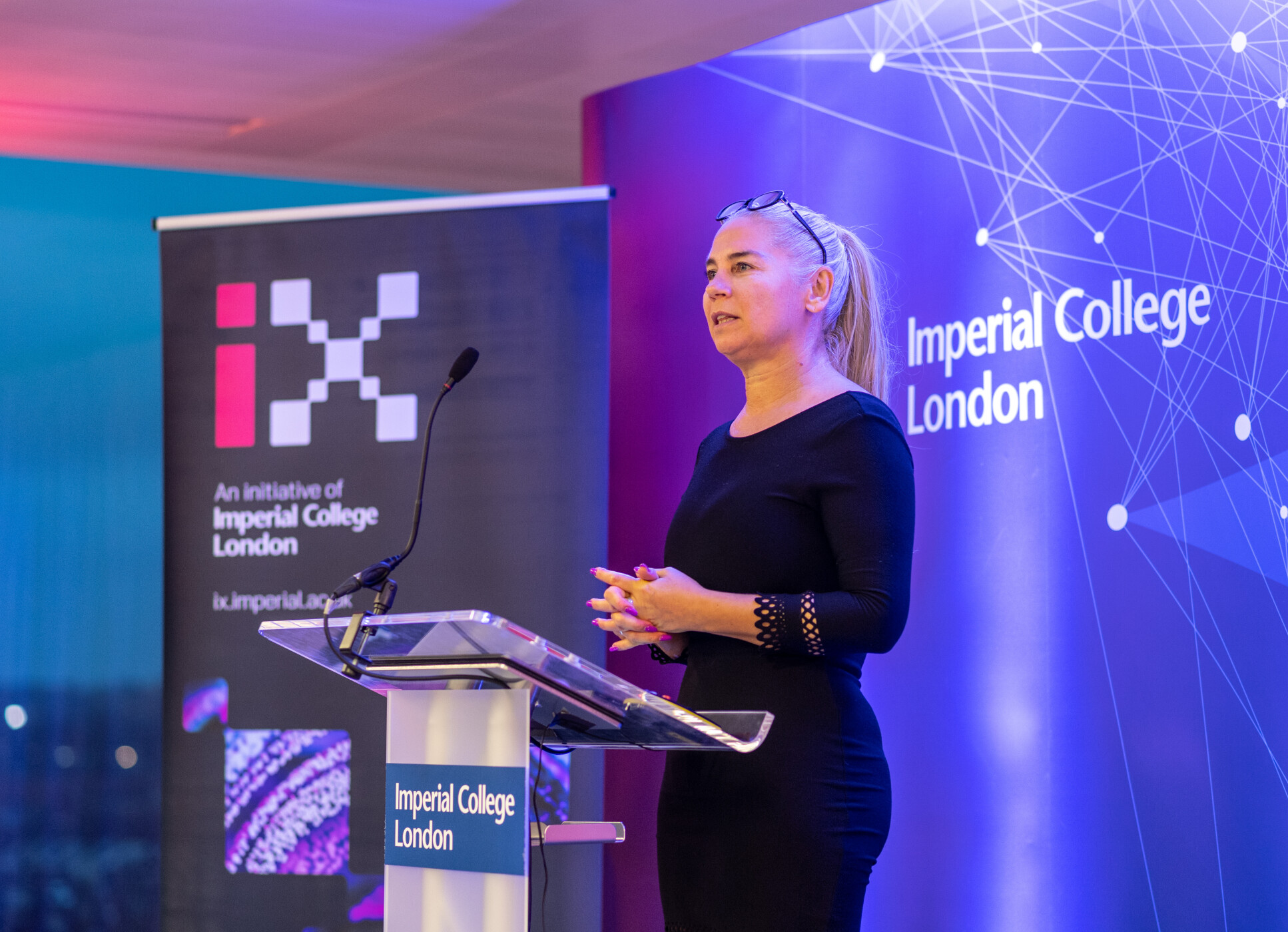
Imperial Takes Lead in Accelerator Initiative to Transform AI Research into Innovative Companies
The AI SuperConnector brings together complementary AI innovation expertise at Imperial, York, Leeds and Liverpool universities.
Imperial is leading a new accelerator project that will help early career researchers in artificial intelligence (AI) turn their work into startup companies. Starting in January 2024, the AI SuperConnector will provide a broad training in innovation and entrepreneurship, while addressing the unique challenges inherent in this fast-moving area of science.
The partners in the initiative – Imperial College London, the University of York, the University of Leeds and the University of Liverpool — have complementary strengths in a wide range of AI sectors, from defence and security to health, and from sustainability and climate change to robotics and autonomous systems.
The AI SuperConnector will transform today’s researchers at the forefront of AI discovery into tomorrow’s startup and scale-up leaders.Dr Simon HepworthDirector of Imperial Enterprise
“The AI SuperConnector will transform today’s researchers at the forefront of AI discovery into tomorrow’s startup and scale-up leaders,” said Dr Simon Hepworth, Director of Imperial Enterprise. “These researchers will already be experts in state-of-the-art AI and its application to societal challenges, but thanks to the AI SuperConnector they will become conversant in commercialisation and comfortable in ecosystems that span multiple business sectors.”
The initiative has secured nearly £1.5 million in support from the Research England Connecting Capability Fund. It will accept applications from early career researchers in all four institutions, offering them a six-month programme that will focus on developing the commercial potential of their innovations.
Turning researchers into founders
The AI SuperConnector builds on Imperial’s experience running the MedTech SuperConnector, a collaborative medical technology accelerator set up in 2018. In its first three years, this initiative has expanded the horizons of over 85 early career researchers, and created 14 spinouts. These new companies raised more than £17 million in venture capital funding and grants in their first three years.
“Our aim is to customise the core elements of the MedTech SuperConnector to address the unique challenges of AI,” said Dr Hepworth. “But we will maintain our MTSC’s principles of bold experimentation, open access to our methods, and personalised support for the founder.”

The initiative will address AI-specific challenges such as rapidly advancing technology, regulatory frameworks and ethical concerns around its use. It will also tackle regional inequalities in funding and difficulties accessing investment and infrastructure for early stage startups.
The six-month accelerator programme will challenge the founders to address both the technology they have developed and the market for their innovations. “It will combine the fundamentals of entrepreneurship, such as business planning, financing, marketing, and management with foundational knowledge of AI and its applications,” said Dr Hepworth. “The participants will benefit from case studies of successful AI startups from all the partner universities to demonstrate how to apply AI in a business context.”
In the process, the AI SuperConnector will connect participants with experienced entrepreneurs, investors and AI experts. It will also make available shared resources, such as AI-specific tools that can help reduce overheads in the early stages of company development.
A network of experts
Each university involved in the AI SuperConnector will lead in a sector reflecting its existing strengths. “This will feed into the training and support provided by the accelerator, and it will also address the challenges and pain points specific to the sector and regions in commercialising the AI product or service,” said Dr Hepworth.

Addressing this regional dimension is a particularly important aspect of the project. “A significant proportion of funding for AI commercialisation remains concentrated in the south of England, particularly in London,” Dr Hepworth said. “To ensure that all regions, nations, businesses and sectors can benefit from AI, support mechanisms are needed to enable the diffusion of AI across the whole economy.”
The AI SuperConnector will accept two cohorts of potential startup founders, drawn from the four partner universities, with a focus on teams of early career researchers. It will also strive to support a diverse community of founders, in order to address the dramatic under-representation of women in AI startups.
Potential candidates can already register their interest in taking part. Meanwhile, the initiative is also looking for additional entrepreneurs and experts with AI experience who are willing and able to mentor the teams.
Imperial’s AI ecosystem
Imperial has been the starting point for many AI companies over the past decade. Some have grown rapidly, with metaverse innovator Improbable and insurance assessment company Tractable achieving unicorn status in just a few years. Others have made quick exits: Magic Pony Technology and Fabula AI were acquired by Twitter, Surreal Vision by Facebook, Graphics Fuzz by Google and Ariel AI by Snap Inc.
 A new generation of AI startups and spinouts is now taking root on Imperial’s White City Campus, and it is here that activity for the AI SuperConnector will have its focus. This innovation hub is already home to many innovative AI startups and spinouts, from record label builder Instrumental to education and training facilitators QuenchAI and Hive Learning, from AI safety specialist Safe Intelligence to sports broadcast innovator Quidich. They are joined by a cluster of companies applying AI to biotechnology, such as Eden Bio, PentaBind, Solena Materials and PhycoWorks.
A new generation of AI startups and spinouts is now taking root on Imperial’s White City Campus, and it is here that activity for the AI SuperConnector will have its focus. This innovation hub is already home to many innovative AI startups and spinouts, from record label builder Instrumental to education and training facilitators QuenchAI and Hive Learning, from AI safety specialist Safe Intelligence to sports broadcast innovator Quidich. They are joined by a cluster of companies applying AI to biotechnology, such as Eden Bio, PentaBind, Solena Materials and PhycoWorks.
The White City Campus also hosts I-X, a strategic AI initiative launched earlier this year that will harness the College’s long-standing excellence in AI, machine learning, data sciences, and the many fields in science, engineering, medicine and business where they are applied.

I-X recently signed a cooperation agreement with the Royal Air Force, and is supported by emerging AI players such as Fetch.ai and Flawless AI. More broadly, the College has links with major companies involved in AI, such as Microsoft and Google DeepMind.
Meanwhile, the Artificial Intelligence Network brings together expertise from across Imperial’s faculties to provide an inclusive, holistic answer to how AI can help solve our planet’s major challenges.
Universities working together
These strengths are complemented by those of the other members of the AI SuperConnector partnership. The University of Leeds has a multidisciplinary approach to AI, with its Digital Manufacturing Group applying technologies to industrial challenges, and links to companies such as AstraZeneca, GlaxoSmithKline, Pfizer, Syngenta, IBM, Infineum and Synthomer.
We welcome the opportunity to help even more researchers to turn their ideas into next generation AI startups.Dr Martin StowUniversity of Leeds.
“We welcome the opportunity to collaborate with partner universities to help even more researchers to turn their ideas into next generation AI startups, said Dr Martin Stow, Pro Vice-Chancellor for Business Engagement and Enterprise at the University of Leeds.
“Through Nexus, our community for innovators and entrepreneurs, we are backing the growth of new and established AI businesses, providing knowledge and support that enables them to develop technologies to tackle real world challenges.”
The University of Liverpool’s digital and AI expertise spans theoretical, methodological and multi-disciplinary translational activity, including health data, transport behaviour modelling and digital materials discovery. The university also hosts UKRI-funded Centres for Doctoral Training in distributed algorithms, data analytics and innovation in data intensive science.
We’re thrilled to be creating a supportive infrastructure through establishing networks and mentorships, and bringing together stakeholders across academia, industry and investors.Professor Anthony HollanderUniversity of Liverpool
“The University of Liverpool is part of the strong regional AI innovation ecosystem, and the AI SuperConnector project is an opportunity for us to build a UK-wide AI startup support network to advance AI innovation,” said Professor Anthony Hollander, Pro-Vice-Chancellor for Research and Impact. “We’re thrilled to be part of a collaboration that is creating a supportive infrastructure through establishing networks and mentorships, and bringing together stakeholders across academia, industry and investors.”
Meanwhile the University of York has a focus on assurance and regulation in robotics and autonomous systems thanks to its Institute of Safe Autonomy and its Assuring Autonomy Programme, a partnership with Lloyd’s Register Foundation.
“We are excited to be part of this partnership that embraces the expertise in AI that York has to offer, especially in the areas of autonomous systems, robotics and machine learning, while leveraging the already established capabilities found in London,” said Luke Souter, Commercialisation Manager for Research, Innovation and Knowledge Exchange (RIKE) at the University of York. “We look forward to helping strengthen our regional support for new AI businesses in the North of England.”
